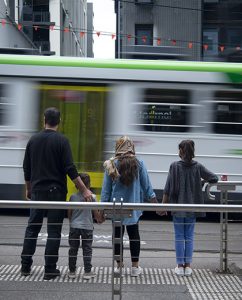Afghan photojournalist tells how he became the story
For twenty years Omar Sobhani covered war and social transformation in Afghanistan as a photojournalist working for Reuters; recording the human cost of armed struggle as well as the hopes and dreams of a new generation.
He never dreamt that he would become a victim of the decades-long conflict that has beset his homeland.
But in August last year, after the Taliban seized the capital, he was one of more than 100,000 people airlifted out of Kabul.
“We were evacuated by Reuters when the Taliban occupied Kabul. The city fell on August 15 and we left for or five days later by charter flight to Islamabad,” Omar said.
As a photographer for a western agency and often working alongside western military forces, Omar became a target for the brutal fundamentalist Taliban militias.
“I covered war, conflict and daily life in Afghanistan for twenty years. I think I have watched the life of my country over two decades – across all the provinces. From the start of a new era of democracy and human rights and hope in my country – and then the end of that as the Taliban came back,” Omar said.
 Omar was caught up in a suicide attack on journalists in Afghanistan in 2018. Journalists covering an earlier bomb blast during the morning rush hour were standing in a loose group near the site of the explosion when the suicide bomber struck, killing seven people outright and wounding several, two of whom later died.
Omar was caught up in a suicide attack on journalists in Afghanistan in 2018. Journalists covering an earlier bomb blast during the morning rush hour were standing in a loose group near the site of the explosion when the suicide bomber struck, killing seven people outright and wounding several, two of whom later died.
The bomber deliberately targeted journalists, presenting a press card to police before joining the group standing near the first blast site. Islamic State later claimed responsibility for the attack.
Omar was injured by shrapnel in his back and chest but his photo of the outrage was published on the front page of newspapers around the world.
He also covered an attempted suicide bomber attack Afghan Vice President Abdul Rashid Dostum at Kabul airport in 2018 as he returned from exile in Turkey.
And in 2015, Omar covered bitter fighting between Afghan police and army and Taliban insurgents on the outskirts of Kunduz City.
But Omar’s work did not always involved bloody conflict.
“Usually when we go to shoot for a story, we are faced with a bomb blast, a suicide attack, or some other type of violence here in Afghanistan.
“But I was pleasantly surprised when I visited Afghanistan’s National Institute of Music in 2012.
“Even though I had lived in Kabul for many years, I had no clue this academy even existed — it was the only of its kind in the whole country.
“Foreigners and Afghans were teaching young Afghans how to play all sorts of instruments, as well as to sing.
“What struck me most is the opportunity given to women. There are not many opportunities for women in Afghanistan to play or sing music — during the Taliban era music was outright banned and women were basically taken away from public life,” Omar said.
But in the chaotic days around the fall of Kabul, Omar and his colleagues were forced to give up their work recording the events unfolding in front of them to look after their families.
“Things were going from worse to worse day by day. On August 15 the Reuters office told us the Taliban were in the city,” Omar said.
“Our office was closed. It was in the same street as a lot of embassies – the British and Canadian included. But the whole street was deserted,” he said.
“Everyone was trying to save themselves and their families. Reuters contacted the Pakistan embassy and they were able to get visas for all of the Reuters’ staff and families.
“Everyone was hiding in their houses or relatives houses. Twice we went to the airport in mini-buses. But there were thousands of people there and we couldn’t get in. We had wives and kids with us, some of whom were sick, so we decided we couldn’t stay at the airport.
“The third time we tried, Reuters managed to get us into the airport and on to a charter flight,” Omar said.
While Omar, his wife and six children were flown out of Kabul when the city fell, his wife and three children were forced to return to Kabul because of problems with their documents.
“They had to wait for three months for a Pakistan visa. Eventually they were able to cross the border into Pakistan again and then come to Australia,” Omar said.
Omar and three of his children arrived in Australia in December. His wife and three other kids arrived last month.
“I can’t explain what it feels like to have them all here and safe after so many months. I’m very relieved,” he said.
Omar said he hoped life in Australia would deliver a bright future for his children and a new career for himself.
“We grateful to be here. My kids have the chance of a good education and a good life. I have a disabled son and I hope to get care for him,” Omar said.
“I hope to work in Australia. I’m not sure what I will do – I have no documents or equipment but I hope to continue my job as a photojournalist,” he said.












